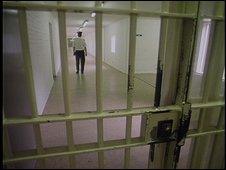How Ken Clarke's prison policy has been shaped
- Published

The plans mark a change in the Tories' views on crime
"Prison works," said Michael Howard as Home Secretary in 1993. At the time, it signalled a significant hardening of the Tory government's approach to crime and punishment.
Since Mr Howard made that speech, prisoner numbers have been rising pretty steadily; the figure currently stands at about 85,000.
Now we have the fascinating spectacle of the Conservative Justice Secretary Ken Clarke expressing his "amazement" at the prison population and looking seriously at ways to get it down.
At the same time we can open the Daily Mail and read his shadow - Labour's Jack Straw - praising Michael Howard. Mr Straw says Mr Howard "deserves credit for turning the tide", and argues that crime began to fall from 1995 as the prison population went up.
The reason for this, says Mr Straw, is that putting more serious criminals behind bars means they simply cannot be on the streets committing crimes.
He goes on to argue that the number of adults reoffending has actually fallen. But Mr Clarke's political advisers focus on the reoffending rates among short sentence prisoners. They say 60% of prisoners who are behind bars for less than a year go on to commit another crime within a year.
Manifesto pledges
As Mr Clarke accepted in his speech earlier: "There is a great mass of academic and social research on both sides. You cannot prove it either way. Prison is the necessary punishment for many offenders."
On that most mainstream politicians agree.
But this speech does seem to reflect a pretty significant change in tone from the Conservatives on crime.
In the party's election manifesto, there was a promise to "increase prison capacity" to stop early release of criminals. There was also a pledge to extend the length of custodial sentences that can be awarded in a magistrates' court.
Labour was also promising to expand the prison population with a plan to ensure a total of 96,000 prison places by 2014. If the Conservatives wanted even tougher sentences, the prison population could very easily have topped 100,000.
So what has changed? Two things clearly: the Liberal Democrats entering government, and the harsh reality of budget cuts.
During the campaign Nick Clegg's party said it would cancel the government's prison-building plan. The Lib Dem leader argued prisons had become "colleges of crime" - which turned casual offenders into hardened criminals, and provided many of them with drug habits into the bargain.
In the negotiations over the formation of the coalition, the Liberal Democrats won a significant (if little noticed at the time) concession on this issue. The Tory promise to create thousands of extra prison places was dropped. Long-held Lib Dem ideas on the importance of rehabilitation were planted in the minds of their new coalition partners.
Value for money
The Conservative ministers running the relevant departments - Justice and the Home Office - could perhaps have resisted Liberal Democrat policies in this area. But the tough reality of budget cuts might have changed the terms of this debate.
Keeping 85,000 people behind bars is expensive - each prisoner costs the taxpayer tens of thousands of pounds a year. With many departments facing budget cuts of 25% or more, it might simply not be possible to expand the prison population much further.
So - as they doing in many other areas - ministers are looking at ways of getting better value for money. One idea which Mr Clarke says he wants to explore further is "payment by results". This would include paying private firms and voluntary groups more if they successfully cut reoffending.
A sentencing review this autumn will also be crucial. As Mr Clarke said, there is no point in looking at prison buildings and places without examining how and why people end up there.
There's no specific commitment today to reduce the overall prison population. But that, clearly, is Mr Clarke's hope.
To do so at a time of shrinking budgets, without a sharp spike in crime, will be difficult. If the justice secretary fails, there will be plenty of Tories ready to argue that we should be putting more criminals behind bars.
- Published30 June 2010